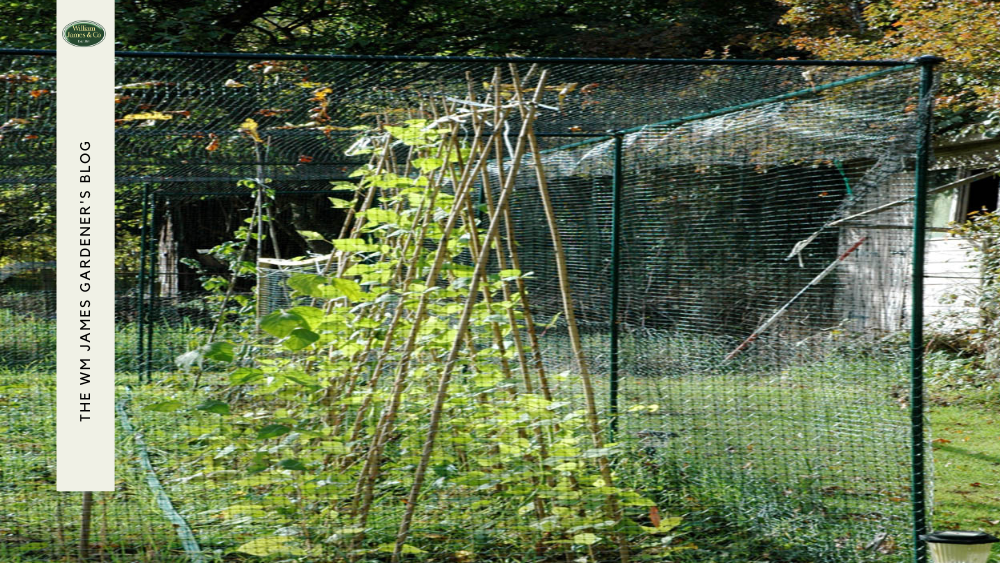We use cookies to make your experience better. To comply with the new e-Privacy directive, we need to ask for your consent to set the cookies. Learn more.
Growing Herbs Indoors: A Guide to Kitchen Herb Gardening in the UK
- Admin
- WM James Gardening Blog
- 21 Dec 2020
-
764views
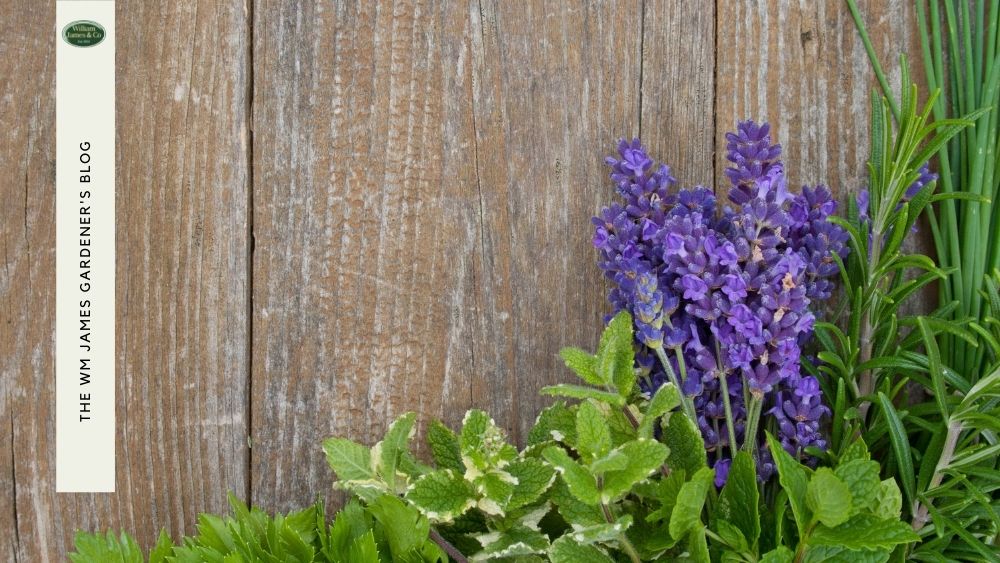
Herbs are the plant that keeps on giving: they look good, smell good, and do you good. Growing herbs indoors is a great way to combine the pleasure of indoor plants with tasty ingredients for home-cooked meals.
Herbs have a wonderful fragrance that will fill your home and inspire you to cook incredible dishes. What’s more, they have health-giving and medicinal properties too.
Growing herbs indoors is convenient, easy and saves you money off supermarket produce and is excellent for a house without a garden.
All you need for indoor herb growing is to ensure the right environment for your micro-garden, and you can have windowsill herbs at your fingertips all year round.
Indoor Herb Growing - A Brief Introduction
It’s useful to know what the best choices to make are when growing herbs indoors.
Kitchen herb gardening often starts with perennial herbs, such as:
these are some of the best herbs to grow indoors in the UK and are easiest to start from young plants that you buy at a garden centre.
You can also use small plants dug from the garden as a starter for growing herbs in pots indoors, or even fruit such as lemons!
Many herbs can be started from cuttings, too. For instance, basil and mint are easy to root in a glass of water. Some herbs, such as basil, cilantro and chervil, are best started from seed and replanted throughout the year.
When to Grow Herbs in the UK
If you do want to focus on fast-growing herbs from seed, it’s best to sow herb seeds in April or early May when there’s less risk of frost.
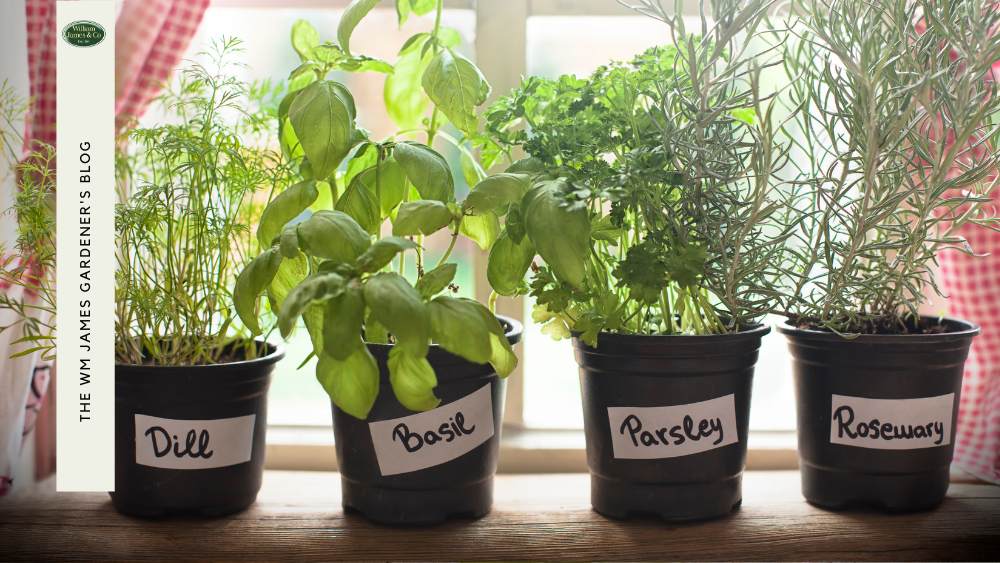
5 Best Herbs to Grow Indoors
Indoor herb growing, and especially kitchen herb gardening, can become all-embracing, but for starters here are five of the best herbs to grow indoors.
Basil Herb Plants
Basil thrives in heat and light, so keep it in an especially sunny window or under a grow lamp.
When well-tended, basil will keep and grow for several weeks, but a long-term supply will require frequent replanting.
Basil is packed with beneficial essential oils that help to protect the body against harmful microbes and bacteria. This antibacterial, anti-inflammatory, and antimicrobial herb helps to prevent the growth and spread of bacteria that cause ailments.
Rich in beta-caryophyllene and vitamins K, C, and A, basil is also a natural source of antioxidants. It can help prevent inflammation, boost the metabolism, lower blood pressure, reduce free radicals, and lower blood sugar levels.
Thyme Herb Plants
Plant thyme in fast-draining soil mix and give it a spot on a warm, sunny windowsill.
Even though the herb prefers less moisture, you’ll still need to keep the surface of the soil moisturised to prevent wilting.
Beloved by chefs and gardeners alike, thyme has become one of the most popular herbs in the world thanks to its mild, herbaceous flavour and ease of growth.
From the Mediterranean to the Caribbean, thyme is cultivated and used in cooking around the world, known for both its range of culinary uses and herbal health benefits.

Rosemary Herb Plants
Rosemary grows year-round as long as there’s access to a strong light source.
A native of the Mediterranean region and member of the mint family, rosemary is easy to grow with great culinary and ornamental value.
The key to growing rosemary is well-drained soil that stays evenly moist at first; as the plant takes root, it becomes increasingly drought-tolerant. It is excellent for containers and so will grow happily indoors in the winter.
Unlike most herbs, rosemary has a more robust flavour when fresh than when dried. Trim it regularly to encourage tender new stems, or the plant will get woody.
Sage Herb Plants
Sage is often overlooked in kitchen herb gardening. It will be most flavorful if exposed to lots of sun in well-draining soil.
It’s best known for its fuzzy exterior and intense herbal aroma, which makes it a bold addition to any dish.
Hailing from the Mediterranean, this fragrant herb has transformed from an ancient medicinal tool to a versatile ingredient in many international dishes.
Thought to have originated in the Balkan Peninsula, sage has a culinary and healing history dating back many centuries. Sage was used in ancient Rome, to heal ailments ranging from digestive issues to bleeding wounds.
Parsley Herb Plants
Parsley grows both in full sun and partial shade, but it does best when shaded in the hot afternoon hours. For fast-growing herbs, this one is a leader.
Be sure to plant it in a deep pot as it can shoot up to two feet tall.
Although the exact origin of the parsley plant is unknown, this biennial has been grown for centuries in regions of Greece, Italy, Spain, Portugal, Morocco, Algeria, and beyond. The herb’s Latin name comes from the Greek word “petro,” meaning stone, as parsley was said to have first grown in the rock-covered hills of Greece.

Are there Specific Windowsill Herbs to Grow Indoors?
Growing herbs in pots indoors takes some planning. Some herbs are trickier to grow from seed, because they are either slow-growing or take a long time to germinate.
Rosemary, thyme, bay and oregano all fall into this category.
With these varieties it’s a better idea to buy a small plant from the garden centre, and grow it on at home. Basil, coriander, chives, parsley, mint, sage, chervil and tarragon are all ideal candidates for a focus on windowsill herbs started from seeds.
Starting from seed is a less expensive alternative, but as windowsill herbs, they'll require more attention, and it will be several months before you can start using them.
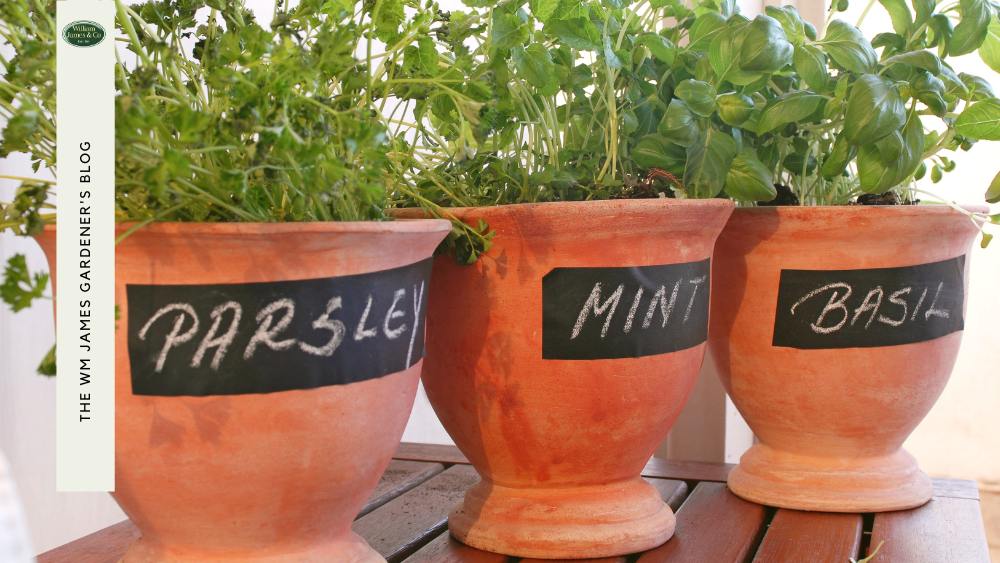
Tips for Growing Windowsill Herbs
First and foremost, you are going to need a dedicated space, an area that’s clear and easily accessible for watering the plants, which also has a steady supply of sunlight for the plants.
If you are growing herbs in pots indoors and starting with small plants, you can successfully plant multiple herbs in a wide or long container or use at least a 6-inch pot for individual herbs. Seeds won't require a large pot.
You can start them in any small container and move them into their final pot when they are 2 - 4 inches tall.
Make sure your pots have plenty of drainage holes, and have a saucer under them, so you don't ruin your windowsill or furniture.
What Herbs Can You Plant Together?
|
Drier Soil |
Moister Soil |
Full Sun |
Partial Shade |
|---|---|---|---|
|
Rosemary, lavender, thyme. |
Mint, chives, basil. |
Thyme, sage, rosemary, tarragon, oregano. |
Rocket, sorrel, mizuna, parsley, chervil. |
A common mistake when growing herbs indoors is growing plants with different watering needs in the same container.
Some herbs to plant together are rosemary, lavender, and thyme, which thrive in drier soil.
Whereas others, like mint, chives, and basil, prefer generous watering.
When you know which herbs to plant together, it makes sense to only group plants that require similar growing conditions and buy separate containers for those that don’t. Ensuring your herb pots have enough drainage is vital, as most herbs do not like to be kept in standing water.
Do Indoor Herbs Need Full Sun?
With indoor herb growing, it's not entirely true that all herbs like full sun, so when planning your kitchen herb garden, divide your plants into two sections of herbs to plant together.
1) Herbs like thyme, sage, rosemary, tarragon and oregano that like full sun;
2) Those that like partial shade, such as rocket, sorrel, mizuna, mustard, parsley and chervil.
If light levels in the British winter are low and your windowsill herbs are lacking, give them a boost by placing two or three fluorescent lights above your indoor herb garden.
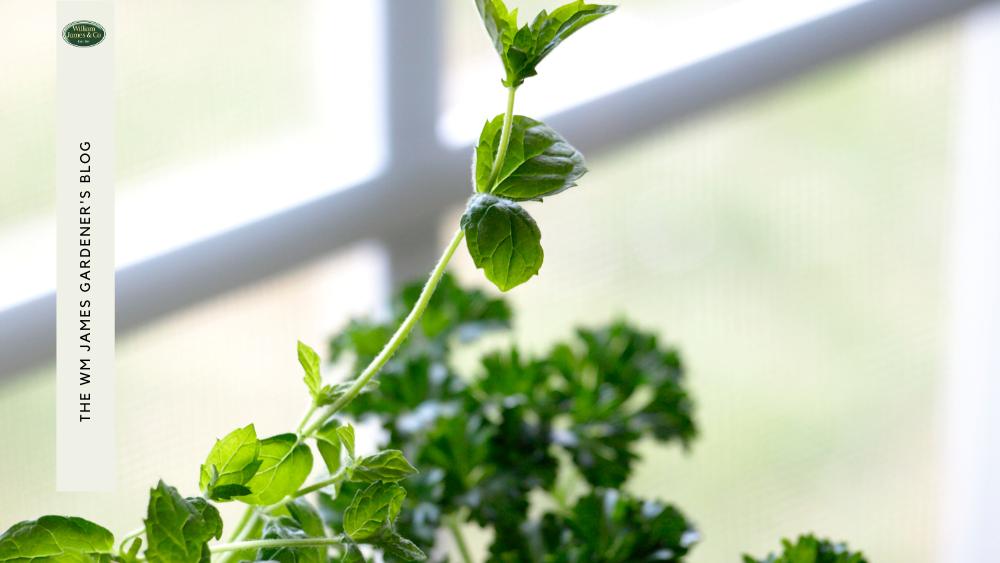
Indoor Herb Soil
The happy kitchen herb garden requires the right potting mix that will help moisture retention and allow drainage.
Indoor herb growing should never make use of soil from outside as it’s not appropriate and to be avoided. Most general, multipurpose composts are perfect for growing herbs indoors in containers, but check the label to make sure.
Depending on which compost you have chosen, your herbs will need feeding after about 5-6 weeks.
As you are most likely growing your herbs in a small container, the roots are limited to a small space and will absorb nutrients quickly—feed windowsill herbs with a half-strength feed every fortnight.
Planting Fast-Growing Herbs for a Constant Supply
|
Fast-Growing Herb Plants |
Ready to Harvest |
|
Cress |
40 days |
|
Dill |
2-3 weeks after germination |
|
Basil |
4 weeks |
|
Coriander |
Within 4 weeks of germination |
|
Chives |
60 days after plants |
Cress is the sprinter of fast-growing herbs. Dill is also one of the best herbs to grow indoors. From sprout to harvest, you're looking at about 40 days.
And while dill isn't as popular as other herb varieties, it's surprisingly versatile for kitchen herb gardening. To increase growth and delay flowering, pick young leaves regularly.
Basil only takes 8-14 days to germinate, and leaves appear in just 2-3 weeks after that. A tasty and popular choice for those already growing herbs indoors.
The ever-popular Coriander will mature in 50-60 days. The seeds will germinate within 2-3 weeks and will produce leaves for harvest within four weeks.
At 60-90 days, chives are a bit slower to start, but this herb will keep growing and growing. Chives are great sprinkled into eggs in the morning, over a baked potato or mixed into a bread dough.
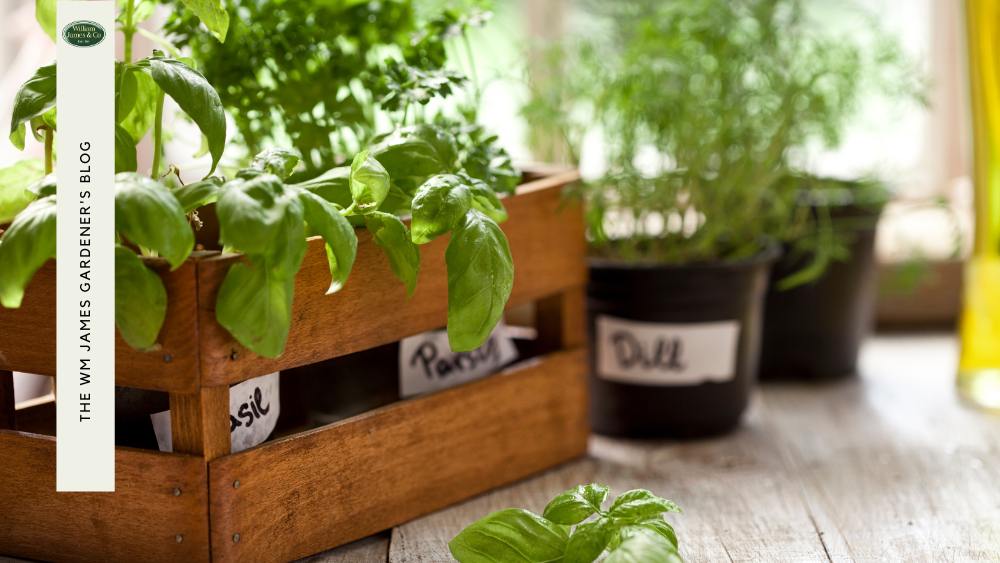
Summary: Why You Should Be Growing Herbs in Pots Indoors
You should be looking at growing herbs indoors if you are a keen gardener and want some indoor herb growing to keep you busy.
Or maybe you’re a cook who likes using fresh produce and experimenting with unusual flavours! Either way, it's a fantastic way to bring a bit of the outside in.
Whatever your motivation or interest, and with so many regular and unusual herbs to plant together, indoor herb growing is the perfect indoor activity.
FAQs
Can You Grow Herbs Indoors All Year Round?
Yes, herbs can be grown indoors all year round, which makes it great for chefs or cooks who like to use fresh, home-grown ingredients
Which Herbs Grow Well Indoors?
Some of the best herbs to grow indoors in the UK are rosemary, oregano, thyme, chives, bay laurel, and mint. Basil, coriander, chives, parsley, sage, chervil and tarragon are all ideal candidates for windowsill herbs.
How Do You Keep Herbs Alive Indoors in the Winter?
Move your indoor herbs away from the windows during cold weather and cover them with fleece or a cloche.
Do Herbs Grow Back After Cutting?
Most fresh herbs will continue to grow after they are cut. Regular and light pruning can help encourage the growth of new leaves.








